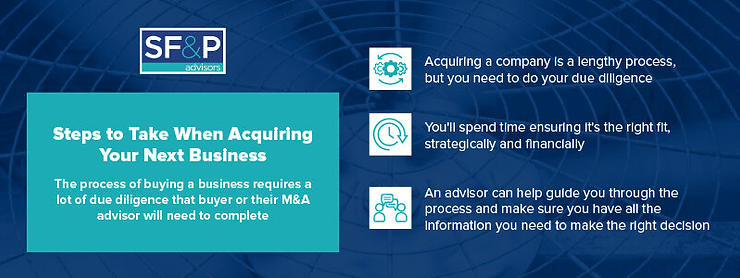The process of buying a business requires a lot of due diligence that buyer or their M&A advisor will need to complete
Whether you’re a current business owner who’s looking to expand or a new entrepreneur who wants to be your own boss, acquiring an existing company is the most straightforward way to begin.
When you acquire an established business, most of the equipment and infrastructure are likely already in place, which cuts down on the work you’ll need to do before it starts generating revenue. The business may also have a location, experiences employees, and an established customer base, all of which can ease your transition.
While acquiring an existing business may be the simplest way to start one, there are some steps you’ll want to take to ensure you end up with a favorable deal. Here are 6 proven steps you should take when looking to acquire a business.

1. Identify the type of business you want
Before you even think about entering negotiations or looking for sellers, decide what type of business you want to buy. Often, the best opportunities are found in small companies earning between $1 million and $10 million per year because you can probably grab one without breaking the bank.
Companies with simple business models like those in HVAC, construction, and plumbing, are favorable investments because you only have to worry about providing a single service. It’s worth noting that, if you need to work for the company to turn a profit, it’s best to select an industry in which you have experience.
2. Search for motivated sellers
A motivated seller is often someone who is looking to retire in the near future and searching for an exit strategy. Depending on how motivated the seller is, you can sometimes acquire the company for far less than it would cost you otherwise. Finding motivated sellers can be a challenge, but there are networks that connect buyers and sellers to make your life a lot easier. An M&A advisor can help you access these networks.
3. Look at the books
Before beginning negotiations, you’ll want to look at the company’s books. You might have to sign a nondisclosure agreement to reach this stage.
Your goal here isn’t to go over the financials thoroughly but rather to determine if the company is making money. It’s important to note that the money you have coming in should be enough to cover your salary and any financing you require.
The company’s financials will also provide information on how much they’re spending on marketing and other services that will offer insight into how much room there is to grow.
4. Speak with the owner
Having a conversation with the owner is a solid step because creating a connection can help the sale move forward. Many small business owners are hesitant to sell if they feel like the buyer won’t take care of the company. They’ve likely built the business from the ground up and have a good relationship with their employees and customers that they’ll want you to maintain.
If you can show that you’ll respectably run the business without damaging the relationships the current owner has created, the chances of the sale proceeding will improve.
5. Consider your financing options
Now comes the time to think about money, as you’ll have to come up with the funds necessary to complete the purchase. There are financing options available that require zero upfront capital from your bank account, and some business owners will even let you repay them using profits from the company.
Assuming the current owner wants the money upfront, lenders specializing in acquisitions are the way to go. They’ll sometimes use business profits as collateral, ensuring you don’t have to dip too far into your savings to facilitate the deal. Generally, your initial requirement will be less than 30% of the final purchase price, but there are all kinds of different structures to consider.
6. Consult with experts
Before finalizing any agreements, make sure you speak with some experts. Accountants and lawyers should be involved to guarantee that the numbers match up and all the paperwork is legal.
Once you’ve signed your documents, you can begin discussing the business with your new employees. You should the role you intend to play in the organization and set some key performance indicators (KPIs) that you’ll use to evaluate the company’s performance moving forward.
Get help every step of the way
A lot goes into acquiring a business, but you can ensure you remain on the right track throughout the process by leaning on expert plumbing and HVAC M&A advisors. These service providers will help you identify viable companies to buy, negotiate the terms, and do your due diligence as you finalize the deal. They also have deep connections in the local area and industry business networks that can put you in touch with motivated sellers in your area.
SF&P Advisors is an industry leader in the facilitation of HVAC and plumbing business sales. Our team helps buyers and sellers find each other, matching business owners with the right people to acquire their companies. Be sure to contact us today if you’re looking to purchase a plumbing or HVAC company in the near future.
